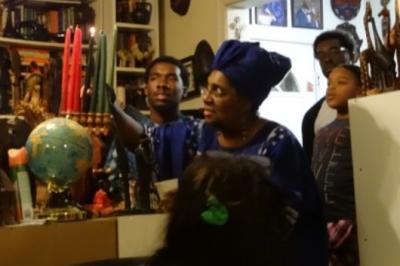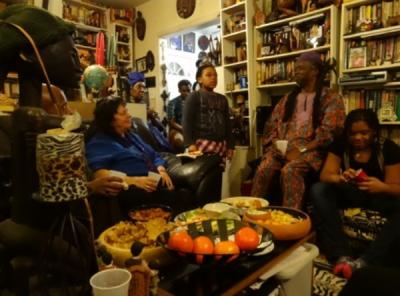
21 Ways to Celebrate the True Spirit of Cooperative Economics with Concrete Collective Action as We Move Into a New Year
 Kwanzaa is an African-inspired holiday practiced by millions of African Americans from December 26 - January 1. African values, which are geared toward care of the whole or the collective rather than the individual, are remembered during this 7-day celebration. Seven principles or values make up the foundation of Kwanzaa—they are listed at the end of this article.
Kwanzaa is an African-inspired holiday practiced by millions of African Americans from December 26 - January 1. African values, which are geared toward care of the whole or the collective rather than the individual, are remembered during this 7-day celebration. Seven principles or values make up the foundation of Kwanzaa—they are listed at the end of this article.
This article* will focus on the fourth principle of Kwanzaa: Ujamaa or Cooperative Economics, which is mostly achieved by the third principle, Ujima or Collective Work and Responsibility. This embodies the value of using our collective energy to economically benefit our communities. Often, many have interpreted Ujamaa narrowly -- supporting black businesses to keep more money circulating in the black community. This may be because we do not know or fully understand our “long and strong” cooperative roots. Newly-freed African people used cooperation and cooperatives to survive during and after slavery, pre-and post-Depression, and every decade up to the present.
However, Cooperative Economics is more than "buying black," which is what some people in the movement have been advocating for many years. It is so much more, especially as we become more savvy and understand that just because someone is black doesn't mean that are above exploiting black people, or that they have the interest of the majority of black people in mind when they act.
One good example of this is that for many years Washington D.C. has had black mayors and a majority black council, yet we continue to have poverty and income inequality and a government that provides tax credits to developers while failing to give similar kinds of support to the neediest people in our society. Another is that we have a black president, yet overt racism is at an all-time high and he does not use the power of the presidency to effect basic change such as stopping the monstrous rate of black-on-black killings in Chicago, where he hails from, or to even attempt to get a discussion of racism and white supremacy on the national agenda.
21 Ways to Practice Ujamaa and Ujima
Here is a list of 21 practical ideas to practice Cooperative Economics. Most of them involve Collective Work and Responsibility:
1. Organize a buying club in your neighborhood, housing co-op or apartment building. Items such as laundry detergent, toilet paper, paper towels, oil, rice, pasta, flour, sugar and seasoning can be purchased in bulk and the cost shared so that everyone gets these items cheaper than what they would pay buying them retail.
2. Get a group of 5-7 people together to start to put money together to loan each other money. Five people contributing $50 or $100 could result in a $250 or $500 loan for each member. This method is practiced in Africa and Asia and the Caribbean and is known as "susu", and by other names.
3. Organize childcare cooperatives in your apartment, housing co-op, street or subdivision. This could significantly reduce child care costs for those who participate, making it more convenient for people to work, go to school, volunteer, or to participate in community organizing.
4. Shop at farmers' markets, support Three Part Harmony Farm or buy a share in a Community Supported Agriculture program. There are many black farmers struggling to sell their produce. A city like D.C., especially in communities like Southeast, could have a special relationship with black farmers, or any farmers, locally or from the South, to lessen the costs of fresh food for everyone.
5. If no one in your apartment building or housing cooperative has access to a computer, printer and fax, chip in and buy the whole set up. Set rules for its use, including what happens to it if the group disbands. Make it possible for your building to have access to a computer without having to leave to go to the library. You could do the same for a car, or other equipment that meets the needs of the people organizing.
6. Rake leaves or shovel snow for elderly people and trade them for a cooked meal, childcare, cooking lessons, or some other knowledge trade.
 7. Teach young people in your community skills such as basic electrical work, carpentry, machine repair, photography, archiving, cooking, nursing, etc. in return for yard work, childcare, or other services; or just have them read a book and report on what they learn. This way you help young people gain skills -- which could result in employment, or even them starting a cooperative -- and so the entire community benefits because they are contributing to the economics of their family and their community. Join a time bank such as Anacostia Dollars or DC Time Banks for more ideas for bartering.
7. Teach young people in your community skills such as basic electrical work, carpentry, machine repair, photography, archiving, cooking, nursing, etc. in return for yard work, childcare, or other services; or just have them read a book and report on what they learn. This way you help young people gain skills -- which could result in employment, or even them starting a cooperative -- and so the entire community benefits because they are contributing to the economics of their family and their community. Join a time bank such as Anacostia Dollars or DC Time Banks for more ideas for bartering.
8. Investigate how you can buy your apartment building to start a housing cooperative, or help start a worker or artist cooperative to help fill needs for jobs, income, or to take care of other needs in the community.
9. Donate used suits of clothing that you no longer want for a young person to use to go on interviews.
10. Support black and local and independent small businesses or businesspersons, cooperatives, artists, yoga and qi gong practitioners and others who are community- and environmentally-minded. Some of them include qi gong instructor and motivational speaker Manifest Ra, acupuncturist Kokayi Patterson and breath worker Ayo Handy (and others in our communities who are helping our people to survive in a more healthy and empowered way).
11. Transact your financial business at a credit union, which is a financial cooperative, and which often are better at providing loans and other financial services cheaply to their members. Some churches have credit unions. If you don't have one in your neighborhood think of organizing one, or asking an existing credit union to open a branch in your neighborhood. Usually you only need $5 to open an account. Check out the African American Credit Union Coalition or the Credit Union National Association for leads.
12. Join with and support attempts to organize a public bank in D.C. to have more input into how tax funds are invested. Working with others who have similar goals and objectives or those that support the common goals is a great investment from our communities which will also benefit from those successes.
13. Get involved in the participatory budgeting process that will be organized soon in D.C. to determine how a portion of how the D.C. budget should be used to help and improve institutions and people in our communities. Would you like to see schools be funded more, or, does your community need a recreation center? Make your desires known to the D.C. Council and work hard to help achieve them.
14. Learn more about the history of black cooperation in this country by reading Collective Courage: A History of African American Cooperative Economic Thought and Practice. Ask your library to order it if you can't afford it, or read my interview with author Jessica Gordon Nembhard, who is from D.C.
15. Join with other community gardeners in existing gardens or work with the Neighborhood Advisory Commissions and the City Council to find vacant land or alleys to grow food.
16. Join or work with groups like the UNIA (Universal Negro Improvement Association), ONEDC, Empower DC, Justice Advocacy Alliance, Black Belt Justice Center and other groups which are working to bring about economic justice.
17. Get involved in the rising Solidarity Economy movement in D.C.
18. Take care of yourself physically, mentally and emotionally: eat well, exercise, pray, meditate and commune with other people. And if you're an already seasoned (overworked!) activist especially, be sure to balance your life with "fun." The stronger you are, the harder and more creatively you can work to build cooperation through collective work and responsibility.
19. Organize a discussion group around local or neighborhood issues, organize support groups such as for single mothers, those caring for elderly parents, etc. to share ideas and best practices, or to have an outlet for ideas and creativity. Or talk to an elder in your family and learn some of the ways that they survived hard times. Share the knowledge.
20. Spend time alone every day to meditate, contemplate or listen to the voice of the Universe. Great ideas spring forth when you take time out of the Matrix to listen.
21. Read about other struggles and get other ideas from reading articles and watching videos at Grassroots Economic Organizing
* This article is adapted from a presentation made by Ifateyo on Pacifica Radio’s Washington, DC station WPFW on December 29 about Kwanzaa and the celebration of the Ujamaa principle.
THE KWANZAA PRINCIPLES, PRONUNCIATION, AND MEANING
from The Black Candle website
Umoja (Unity)
Umoja (OO-MO-JAH) Unity stresses the importance of togetherness for the family and the community, which is reflected in the African saying, "I am We," or "I am because We are."
Kujichagulia (Self-Determination)
Kujichagulia (KOO-GEE-CHA-GOO-LEE-YAH) Self-Determination requires that we define our common interests and make decisions that are in the best interest of our family and community.
Ujima (Collective Work and Responsibility)
Ujima (OO-GEE-MAH) Collective Work and Responsibility reminds us of our obligation to the past, present and future, and that we have a role to play in the community, society, and world. Seven Candles for Kwanzaa by Andrea Davis Pinkney
Ujamaa (Cooperative Economics)
Ujamaa (OO-JAH-MAH) Cooperative economics emphasizes our collective economic strength and encourages us to meet common needs through mutual support.
Nia (Purpose)
Nia (NEE-YAH) Purpose encourages us to look within ourselves and to set personal goals that are beneficial to the community.
Kuumba (Creativity)
Kuumba (KOO-OOM-BAH) Creativity makes use of our creative energies to build and maintain a strong and vibrant community.
Imani (Faith)
Imani (EE-MAH-NEE) Faith focuses on honoring the best of our traditions, draws upon the best in ourselves, and helps us strive for a higher level of life for humankind, by affirming our self-worth and confidence in our ability to succeed and triumph in righteous struggle.
Go to the GEO front page
Citations
Ajowa Nzinga Ifateyo (2014). Kwanzaa’s Ujamaa and Ujima: 21 Ways to Celebrate the True Spirit of Cooperative Economics with Concrete Collective Action as We Move Into a New Year. Grassroots Economic Organizing (GEO). https://geo.coop/story/kwanzaas-ujamaa-and-ujima

Comments
Annie
June 18, 2020, 8:09 pm
Thanks for this article it has infuse me. God has placed this article in front on me knowing I needed guidance. Thanks because some of us have been trained distrust our family and community.
PETER IRVING GREEN
August 4, 2020, 12:15 am
Good information.
Sarah Hastings
December 29, 2021, 4:44 pm
Amazing article. Thank you!! Using this in 2021.
Add new comment